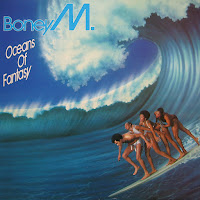release date: Apr. 20, 1979
format: cd (2007 remaster)
[album rate: 3,5 / 5] [3,54]
producer: Dennis Bovell, The Pop Group
label: Radar / Rhino - nationality: England, UK
Track highlights: *1. "She Is Beyond Good and Evil" - 2. "Thief of Fire" - 3. "Snowgirl" - 5. "We Are Time" - 7. "Words Disobey Me" -
*Bonus track on 2007 remaster
Studio album debut by Bristol-founded avant-gardist band The Pop Group consisting of vocalist Mark Stewart, guitarist John Waddington, bassist Simon Underwood, guitarist & saxophonist Gareth Sager, and drummer Bruce Smith. The original album issue consists of 9 tracks - cd issues of the album add the band's single debut as track #1 and its B-side as track #11, and the running order has been altered slightly. The original vinyl album has a running time of 40 minutes, and with two additional tracks, the cd just exceeds 47 mins.
Stylistically, this mostly sounds like... nothing else really - and especially considering the year 1979, it stands very much on its own. It's both funk, post-punk, and an experimental release, which makes me think of a fine blend of acid rockers Captain Beefheart and post-punk rockers The Birthday Party with the addition of funk. Only, the latter band, alledgedly, appears to have been itself heavily inspired by The Pop Group. So, how did they end up with such an original blend on two stand-out albums that has been hailed as inspirational sources to a long list of followers? The thing is, the album was anything but acclaimed when it came out, and the even sharper follow-up How Much Longer Do We Tolerate Mass Murder? from 1980 didn't make record labels cue in line to sign with this highly original band. Instead, they were met by mixed to negative reviews and the band ended up dissolving after two albums. The members, however, went on to perform in various other constellations who were all somewhere on the frontier of new musical directions - and all far from what was perceived as mainstream.
I have only recently discovered the musical qualities of this band and my first reaction had me thinking of Captain Beefheart and Shriekback. The first name comes to mind by the vocal performance of Mark Stewart and the experimental and krautrock-like and syncopated rhythm section with heavy use of percussion and brass, whereas Shriekback probably have listened much to The Pop Group before mustering it's own sound, which in itself carries a bolder source to the industrial style. In that regard, Y basically represents a huge conglomerate of styles, where the most apparent ones are funk, funk rock, surf rock, post-punk, dub, and garage rock. At the time of the release it probably would've been labeled art punk, I guess. There's definitely also bonds to the strong political approach of The Mothers as well as politically-oriented punk bands of the anarcho-punk rock fraction of the British punk rock wave - again, something which becomes more evident with the angrier follow-up.
Back in the day, I would most certainly have rejected this as being too noicy and too weird, a bit alongside other iconic albums I missed out on upon a first introduction - artists which count The Fall, Crass, The Creatures, and Psychic TV (to name a few), but when knowing of later manifestations of the alt. rock umbrella, The Pop Group has come to stand as founders of something out of the ordinary - an experimental detour into mystic musical landscapes - in a quite refreshing manner.
This is defintely something else - a first draft, you could say - intentionally, it may have been more connected and constructed with experimental krautrock and that of pure funk in mind, but with inspiration from the punk rock scene it surely turned out as a highly original take on genre definitions, and it's nevertheless an exciting take on post-punk with an original tone that would be further investigated on a wilder and more experimental follow-up.
This is recommended for anyone interested in modern music history.
[ allmusic.com, Uncut 4,5 / 5, Mojo, Record Collector 4 / 5, Sounds 3,5 / 5 stars ]












sm.jpg)




